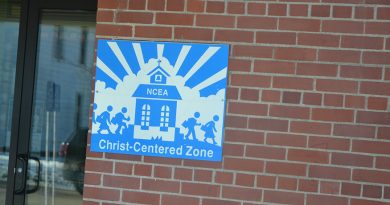Remembering miscarried and stillborn babies as part of our spiritual community
By Mark Schmidt
Director of the Office of Respect Life/Social Justice
I don’t know exactly how old I was, older than 5 for sure, but there is a day in my childhood that continually floats to the surface of my memories. It was the day Dad came home to tell my brothers, sisters and me that “we lost the baby.” I remember us all huddled together, crying. Mom was still at the hospital; Dad had left her side and come home to break the news. What was supposed to be a joyous occasion had turned to tears.
A child not yet born is known to God, we hear in Psalm 139: “You formed my inmost being; you knit me in my mother’s womb … Your eyes saw me unformed”; but we also know that an unborn child is not only known by God but known by mothers and fathers, sisters and brothers. We are reminded of this when we hear the passage of Mary visiting Elizabeth. Though John the Baptist and Jesus were still in the womb: “When Elizabeth heard Mary’s greeting, the infant leaped in her womb” (Luke 1:41).
People often ask me how many kids are in my family. In many families like my own, those siblings or children who are no longer with us are left out of that count. The loss of a child, no matter what age, is devastating and the loss of a child due to miscarriage or stillbirth is no less painful than losing a child to illness or accident. My answer to the question is almost always the same: “There’s 10 kids living. Nine others who died.”
There is almost always shock on the faces of those who ask after I give my response. It occurs to me that people don’t expect me to mention my siblings who aren’t living today. It seems that there is an unwritten rule in “polite” society that those children lost in miscarriage and stillbirth are best kept a secret. When family members do acknowledge their lost loved ones at first usually comes the acknowledgment of the tragedy, but then often comes the almost immediate painful attempt to comfort parents, “You can always try again” or “There’s always adoption.” Or “Well, you didn’t really know them so it’s not like you lost a real child.” And if a mother and father, or the siblings don’t “get over it” in the time others think reasonable, there can be a harshness towards surviving family members. “It’s not healthy for you to keep dwelling on this.”
In truth, my brothers and sisters cannot be so easily replaced, neither to me nor to my parents. They were real. They were my family. We are, as a society, uncomfortable with suffering and so we prefer it left unsaid, kept behind closed doors. But, as a church, we acknowledge suffering; we put it front and center in the crucifix.
Even though I only know one of my deceased siblings by name, Ronnie, who lived only one short month after birth, I still know my other brothers and sisters who died in the womb. I also think of my aunts, uncles, and cousins who, like my brothers and sisters, died before they could be born. It is important that we acknowledge the loss; that we do not try to ignore that a human person has died. The joys that accompanied that short life meant something; the dreams for the future have been cut abruptly short; and the lives of sons and daughters, brothers and sisters, deserve to be remembered. Those lives were, and are still, loved.
Thankfully, my parents’ willingness to talk to us about those who are no longer with us has helped us as a family to not look back with only sadness, but also with love. We have many advocates in the next life interceding on our behalf; that we have the ability, through our faith in the community of saints, to know them, to love them, to communicate with them through prayer and the sacraments. Families, especially mothers and fathers, should feel encouraged to be free to speak of their child openly and our communities respond to them with compassion and support.
The church also has beautiful rituals available for blessings of a family after loss of a child before or immediately after birth. Rites can be celebrated privately or publicly; recognizing a single child, or a memorial for all children lost to miscarriage and stillbirth within a parish.
Each family is in a different place in their journey through the grief and that must be taken into consideration. Catholic Charities of the Archdiocese of Dubuque also offer counseling services for women and men, children and adults, to process and grieve the loss of their loved one.
For counseling services contact Catholic Charities toll free: 800-772-2758.
For resources regarding pregnancy loss go to the Office of Respect Life and Social Justice page at: dbqarch.org/beholdyourchild.




